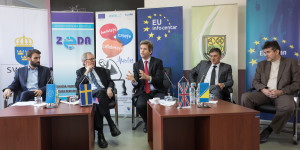Frans Timmermans, First Vice-President of the Commission, Federica Mogherini, the High Representative of the Union for Foreign Affairs and Security Policy and Vice-President of the Commission, Johannes Hahn, Commissioner for European Neighbourhood Policy and Enlargement Negotiations, Neven Mimica, Commissioner for International Cooperation and Development, Dimitris Avramopoulos, Commissioner for Migration, Home Affairs and Citizenship, Christos Stylianides, Commissioner for Humanitarian Aid and Crisis Management, Věra Jourová, Commissioner for Justice, Consumers and Gender Equality, Tibor Navracsics, Commissioner for Education, Culture, Youth and Sport, and Julian King, Commissioner for Security Union, made the following statement:
Today, on the International day for the Elimination of Violence against women, we say: enough is enough.
Women and girls inside and outside the EU continue to experience widespread violence. Throughout the world, women and girls are still being beaten at home, sexually and economically exploited, assaulted on our streets or at work, harassed online or while playing sports, raped, mutilated, or forced to marry. One in three women in the EU today has experienced some form of gender-based violence. We cannot ignore the enormous consequences this has on families, communities, societies and the economy.
More needs to be done in the EU to ensure that any sort of violence against women is eliminated. Almost 25% of women in the EU have experienced physical and/or sexual violence by a partner since the age of 15. More than one in four Europeans think sexual intercourse without consent can be justifiable. More than one in five Europeans think women often make up or exaggerate claims of abuse or rape. Victims of violence often do not report the crime. Bystanders are sometimes reluctant to act. Together we must challenge this and the stereotypes that undermine women’s voices and show that violence against women is unacceptable and will not be tolerated by anyone.
Women and girls are particularly vulnerable in situations of conflict and emergency, when violence, extortion, trafficking, exploitation and many forms of gender-based violence escalate. As a consequence, millions of women and girls are forced to leave their homes. Yet, while they are on the move or seek shelter in refugee camps these women and girls face additional risks of violence from fellow migrants, smugglers and even the authorities in some third countries. Almost all victims of trafficking for sexual exploitation in the EU are women and girls coming from third countries after hazardous journeys.
We work relentlessly to change this. Our humanitarian projects related to gender-based violence will reach almost 3.4 million women, girls, boys and men around the world. As part of the 2016-2020 EU Gender Action Plan in external relations, we continue investing in women and girls whose rights are violated across the world as they are excluded from education, from the labour market, and from political life while facing unequal rules and laws on inheritance, citizenship or land-ownership. In 2017, we will provide specific support to victims of violence in the most remote and fragile areas.
The EU is also strengthening its efforts to ensure that women and girls arriving in the EU fleeing conflict, persecution, instability or poverty have access to medical care, legal support, appropriate trauma counseling and psycho-social care if they have been victims of discrimination and violence.
Today, the European Commission is launching a series of actions for 2017 to combat violence against women and girls in all its forms. We have allocated €10 million to support grassroot efforts to prevent gender-based violence and support its victims in the European Union. Our aim is to raise awareness, provide information and raise awareness about violence against women, targeting the general public as well as professionals who can help change this situation: police officers, teachers, doctors, judges amongst others.
We must, once and for all, say no to this clear violation of our fundamental rights. This is why we are taking action today. We are joining forces together with Member States to put an end to violence against women. All women and girls should be able to lead a life free from fear and violence, in the European Union or anywhere in the world.
For More Information
Factsheet on main results of the gender-based violence Eurobarometer
2016 Gender-based violence Eurobarometer
Say no! Stop violence against women actions
2016 -2020 EU Gender Action Plan
Gender-based violence in sport study



